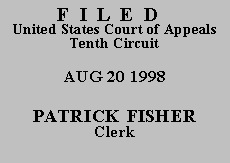

| UNITED STATES OF AMERICA,
Plaintiff - Appellee, v. MANUEL GUILLEN-OROZCO, |
|
U
At sentencing, the defendant moved for a downward departure on the basis that he had extremely pressing family responsibilities and that he was a first-time offender who had provided assistance to the government. The court denied his motion. The following exchange occurred at the sentencing hearing between the trial court and counsel for the defendant:
THE COURT: I'll deny the motion for downward departure. It's not that my heart isn't going out to this fellow, but legally, I don't think I can do it. Do you have anything else you wish to say on behalf of your client before I impose sentence?
MS. MANDEL: Your Honor . . . , I was wondering if there's any possibility that we could -- since the Court is saying that he doesn't have a legal right to make this departure, that is an appealable issue, then we would ask --
THE COURT: That I don't have the legal right?
MS. MANDEL: I believe that's what you're saying, that --
THE COURT: Oh, absolutely not. I have the authority. I have the legal right. I choose not to do so.
MS. MANDEL: Okay. I just wanted to clarify that, Your Honor.
THE COURT: No, I acknowledge I can do it, but I also acknowledge that, under the law, I can't do it on [sic] this case.
MS. MANDEL: But I think that means that, under the law, that in this case you don't have a legal right to do it.
THE COURT: In this case, he doesn't fit the applicable factors for a downward departure. I recognize what they are. I'm saying he doesn't fit them. Now, if you think that means I'm not exercising my discretion, fine. It seems like, to me, I am.
MS. MANDEL: Then you're exercising your discretion.
THE COURT: Yes.
Sentencing Tr. at 5-6.
The defendant seeks review of the district court's denial on the same grounds that he presented to the district court. The government argues that this court has no jurisdiction to review the district court's refusal to depart downward. We agree.
In United States v. Castillo, 140 F.3d 874 (10th Cir. 1998), this Circuit made clear that we have no jurisdiction in cases such as this. There, the court said:
We clarify here that the courts of appeals cannot exercise jurisdiction to review a sentencing court's refusal to depart from the sentencing guidelines except in the very rare circumstance that the district court states that it does not have any authority to depart from the sentencing guideline range for the entire class of circumstances proffered by the defendant. This exception does not apply when a sentencing court concludes under the defendant's particular circumstances that it does not have the authority to depart.
Id. at 887 (emphasis in original) (citations omitted). The above-quoted colloquy between the district court and Guillen-Orozco's attorney demonstrates that the court merely concluded that the defendant's particular circumstances did not warrant a downward departure. Under the rule of Castillo, we have no power to review such a decision.
Accordingly, we DISMISS the defendant's appeal of the district court's refusal to grant a downward departure. Because we dismiss the defendant's appeal, we need not reach the question whether his waiver of appeal in the plea agreement was knowing and voluntary.
ENTERED FOR THE COURT,
Deanell Reece Tacha
Circuit Judge
*.This order and judgment is not binding precedent, except under the doctrines of law of the case, res judicata, and collateral estoppel. This court generally disfavors the citation of orders and judgments; nevertheless, an order and judgment may be cited under the terms and conditions of 10th Cir. R. 36.3.